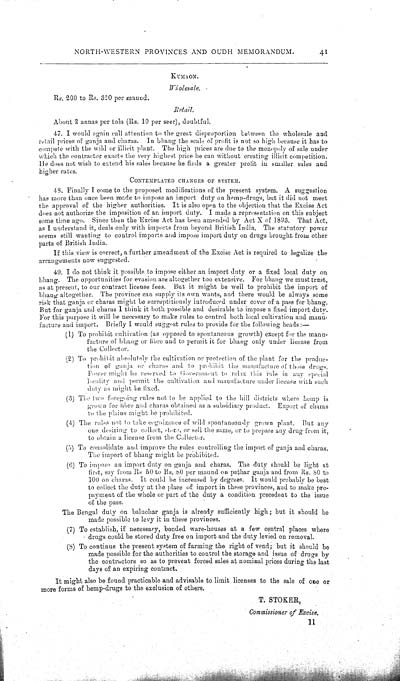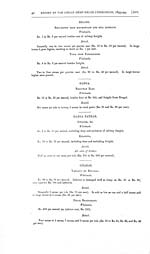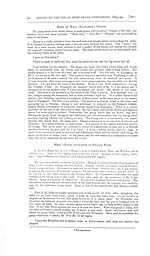Medicine - Drugs > Report of the Indian Hemp Drugs Commission, 1894-1895 > Volume III
(45) Volume 3, Page 41
Thumbnail gallery: Grid view | List view

NORTH-WESTERN PROVINCES AND OUDH MEMORANDUM. 41
KUMAON.
Wholesale.
Rs. 200 to Rs. 320 per maund.
Retail.
About 2 annas per tola (Rs. 10 per seer), doubtful.
47. I would again call
attention to the great disproportion between the wholesale
and
retail prices of ganja and charas. In bhang the scale of profit is
not so high because it has to
compete with the wild or illicit plant. The high prices are due to
the monopoly of sale under
which the contractor exacts the very highest price he can without
creating illicit competition.
He does not wish to extend his sales because he finds a greater
profit in smaller sales and
higher rates.
CONTEMPLATED CHANGES OF SYSTEM.
48. Finally I come to the
proposed modifications of the present system. A suggestion
has more than once been made to impose an import duty on
hemp-drugs, but it did not meet
the approval of the higher authorities. It is also open to the
objection that the Excise Act
does not authorize the imposition of an import duty. I made a
representation on this subject
some time ago. Since then the Excise Act has been amended by Act X
of 1893. That Act,
as I understand it, deals only with imports from beyond British
India. The statutory power
seems still wanting to control imports and impose import duty on
drugs brought from other
parts of British India.
If this view is correct,
a further amendment of the Excise Act is required to legalize
the
arrangements now suggested.
49. I do not think it
possible to impose either an import duty or a fixed local duty
on
bhang. The opportunities for evasion are altogether too extensive.
For bhang we must trust,
as at present, to our contract license fees. But it might be well
to prohibit the import of
bhang altogether. The province can supply its own wants, and there
would be always some
risk that ganja or charas might be surreptitiously introduced under
cover of a pass for bhang.
But for ganja and charas I think it both possible and desirable to
impose a fixed import duty.
For this purpose it will be necessary to make rules to control both
local cultivation and manu-
facture and import. Briefly I would suggest rules to provide for
the following heads:—
(1) To
prohibit cultivation (as opposed to spontaneous growth) except for
the manu-
facture of bhang or fibre
and to permit it for bhang only under license from
the Collector.
(2) To
prohibit absolutely the cultivation or protection of the plant for
the produc-
tion of ganja or charas and
to prohibit the manufacture of those drugs.
Power might be reserved to Government to relax this rule in any
special
locality and permit the cultivation and manufacture under license
with such
duty as might be fixed.
(3) The two
foregoing rules not to be applied to the hill districts where hemp
is
grown for fibre and charas
obtained as a subsidiary product. Export of charas
to the plains might be prohibited.
(4) The rules
not to take cognizance of wild spontaneously grown plant. But
any
one desiring to collect,
store, or sell the same, or to prepare any drug from it,
to obtain a license from the Collector.
(5) To
consolidate and improve the rules controlling the import of ganja
and charas.
The import of bhang might be
prohibited.
(6) To impose
an import duty on ganja and charas. The duty should be light
at
first, say from Rs 50 to Rs.
80 per maund on pathar ganja and from Rs. 80 to
100 on charas. It could be increased by degrees. It would probably
be best
to collect the duty at the place of import in these provinces, and
to make pre-
payment of the whole or part of the duty a condition precedent to
the issue
of the pass.
The Bengal duty on
baluchar ganja is already sufficiently high; but it should be
made possible to levy it in these provinces.
(7) To
establish, if necessary, bonded ware-houses at a few central places
where
drugs could be stored duty
free on import and the duty levied on removal.
(8) To
continue the present system of farming the right of vend; but it
should be
made possible for the
authorities to control the storage and issue of drugs by
the contractors so as to prevent forced sales at nominal prices
during the last
days of an expiring contract.
It might also be found
practicable and advisable to limit licenses to the sale of one
or
more forms of hemp-drugs to the exclusion of others.
T. STOKER,
Commissioner of Excise.
11
Set display mode to: Large image | Zoom image | Transcription
Images and transcriptions on this page, including medium image downloads, may be used under the Creative Commons Attribution 4.0 International Licence unless otherwise stated. ![]()
| India Papers > Medicine - Drugs > Report of the Indian Hemp Drugs Commission, 1894-1895 > Volume III > (45) Volume 3, Page 41 |
|---|
| Permanent URL | https://digital.nls.uk/74551800 |
|---|---|
| Description | North-Western Provinces and Oudh memorandum, cont. |
| Description | Volume 3: Appendices. Miscellaneous. |
|---|---|
| Attribution and copyright: |
|




